Items
topic_interest is exactly
supply chain
-
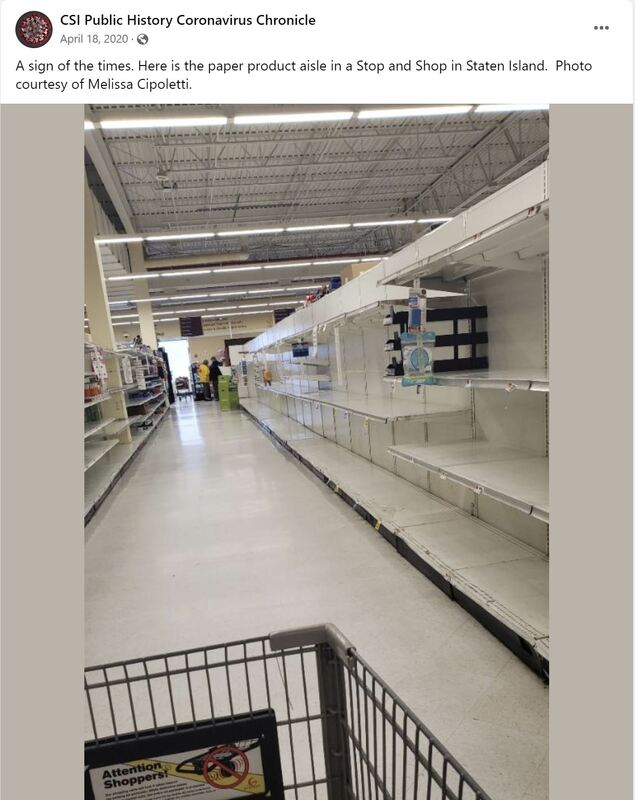 April 18, 2020
April 18, 2020Paper Product Shortage
A sign of the times. Here is the paper product aisle in a Stop and Shop in Staten Island. -
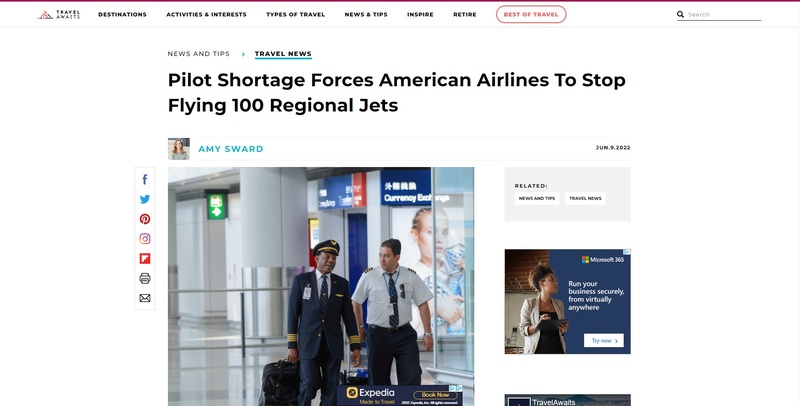 2022-06-09
2022-06-09Pilot Shortage Forces American Airlines To Stop Flying 100 Regional Jets
This is a news story from Travel Awaits by Amy Sward. Due to a pilot shortage, nearly 100 planes are sitting idle because there are not enough people to fly them. Part of the reason for this pilot shortage is because of COVID. It is due to both buyouts and some pilots being forced into retirement due to age requirements. The shortage of pilots has created hiring sprees where companies like American Airlines are offering better pay and work schedules to lure people into flying for them. American Airlines plans to hire 2,000 pilots in 2022. -
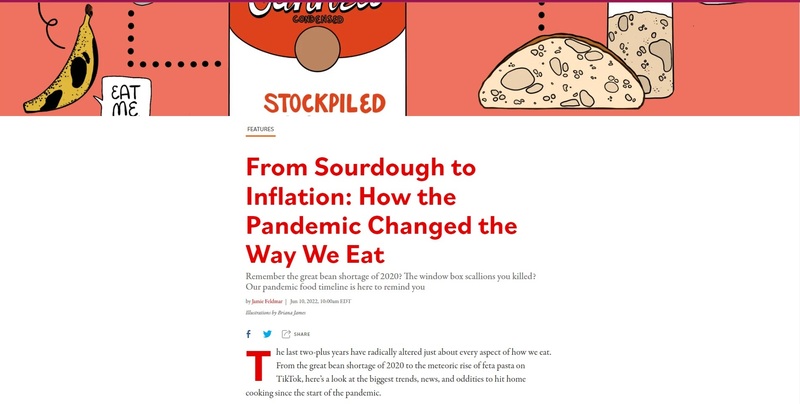 2022-06-10
2022-06-10From Sourdough to Inflation: How the Pandemic Changed the Way We Eat
This is a news story from Eater by Jamie Feldmar. This chronicles the changing food habits of people throughout the pandemic. In 2020, there was a wave of panic buying for things like flour, canned soups, and frozen vegetables. The use of grocery store delivery apps also increased that year. Instacart, a grocery delivery app, saw a 229% sales increase. With the panic buying came people looking for ways to use up things like canned goods and dried pasta. Things like sheet pan dinners, salads, and other easy meals became sought after in that time. Another change that occurred was people trying food trends popular during the pandemic. Things such as sourdough and whipped coffee were major food trends of that time. Meal kit delivery rose during the pandemic. Blue Apron had subscriptions to their food service skyrocket. Hello Fresh did as well, and was forced to close down temporarily to hire 3,000 extra workers to tackle the rising demand. In 2021, other food trends occurred while many restaurants and other dining establishments could not operate at full capacity. Things like espresso martinis and the dalgona candy, and candy made popular by the TV show Squid Game, were just some of those food trends. The food trends were not without labor issues though. In October 2021, Kellogg's workers went on strike, which affected the supply chains of that brand. Supply chain issues have become an ongoing problem since the beginning of the pandemic. In February 2022, the US temporarily shut down avocado imports from Mexico, making the food more expensive. With supply chain issues comes rising inflation. According to the USDA, food prices in 2022 were expected to rise between 6.5% to 7.5% increases. The Russian war with Ukraine cited as one of those causes. May 2022 saw a baby formula shortage, where 40% of baby formula was out of stock. Today, the USDA is looking to learn from the pandemic and the food issues that are occurring. One way they are doing this is through "a framework to transform the food system," which has the focus on building a more resilient supply chain while providing for rural and underserved communities. My own prediction is that the supply chain issues will mean more local food and less imported food overall in the United States. This means opening more food processing plants and increasing work domestically within the food industry to meet demands. The global food system is very fragile to things like pandemics and war. If food prices are to ever get lowered as well, it is important that more food gets produced and used locally. It would have the added benefit of being more environmentally friendly too, as the food would not have to be shipped as far away to where it gets used. -
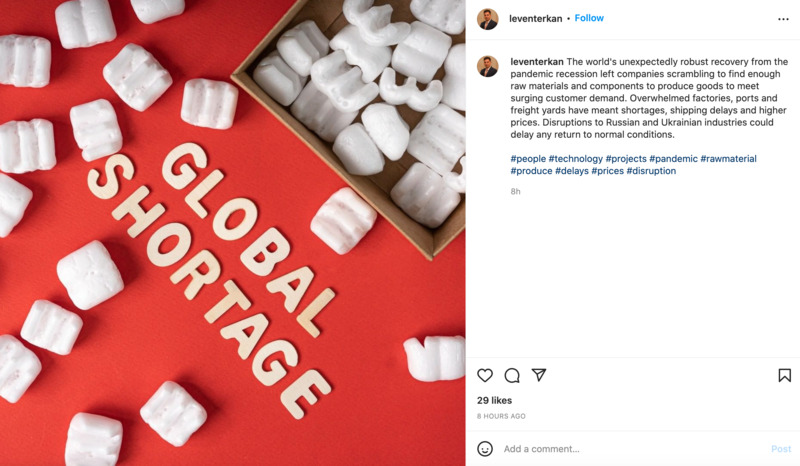 2022-04-07
2022-04-07Global Shortages
This is an Instagram post by leventerkan. This user brings up the problems with shortages of raw materials as a result of the pandemic. Due to these shortages, prices of items have also been rising, leading to more inflation. At the end, it talks about how the war between Russia and Ukraine is making the supply chain issues even worse, as it is freezing up some industry, which could delay any return to normal conditions. -
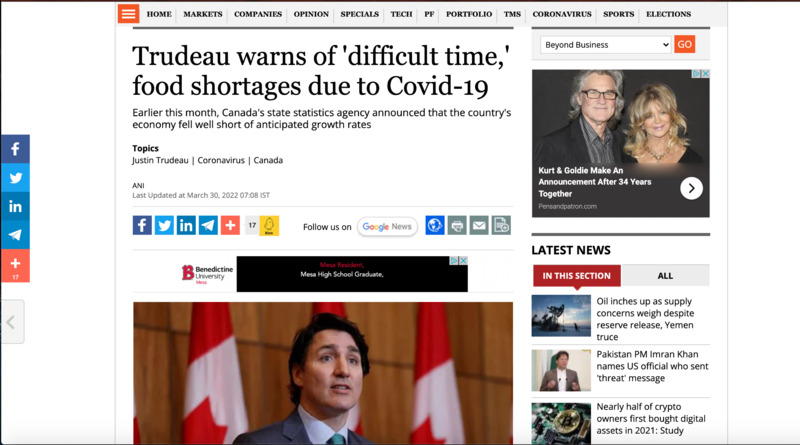 2022-03-30
2022-03-30Trudeau warns of 'difficult time,' food shortages due to Covid-19
This is a news story from the Business Standard. This is about the after effects of COVID on the Canadian population. Prime Minister Justin Trudeau warns that it will be a difficult time with food shortages due to COVID. Some of the blame for the food shortages is also placed on Russia's invasion of Ukraine. Similar tactics of blaming President Vladimir Putin for the rising prices of goods has also been used by President Joe Biden. The global disruption of supply chains results in higher prices of necessities. Earlier in March, the Canadian government announced that the economy fell short of its anticipated growth for that month. In February, inflation in Canada rose by 5.7%, the highest increase since August 1991. -
 2022-03-30
2022-03-30Have a Wedding Budget? Expect to Spend More Because of Inflation
This story from the New York Times by Danielle Braff talks about the rising costs of weddings as a result from COVID. Couples mentioned in this story go on about how just the basics are more expensive than they used to be. Ms. Alvear-Beceiro and Mr. Klebba, despite not spending extra on things like food, decorations, and music, had a wedding budget that topped $30,000. Zola, a wedding planning site, said that a third of the 468 participating vendors had losses of $50,000 or more due to couples postponing weddings in 2020. Supply chain shortages later on have also helped increase the overall costs, and many businesses are still trying to operate to pre-pandemic levels. Due to rising costs, some couples are choosing to scale back the festivities. Shannon Bernadin, after looking at the costs of wedding venues with her husband, decided to have a wedding at a friend's house and use thrifted outfits, along with homemade decor. All in all, this article demonstrates the changing economy and how that has impacted the wedding industry and how people plan weddings. -
 2022-03-24
2022-03-24Welcome to the Wedding Boom. How Couples are Handling the Busiest Season in 40 Years
This is a news story about the rising amount of weddings happening in 2022 after some couples have had to put them off. This story by NPR details changing wedding trends along with it. Wedding dress retailers such as David's Bridal say the demand for maternity wedding dresses is at a 10% increase. Wedding site, The Knot, has had a 25% increase. Financial stress in planning these weddings has also increased. Mandy Connor, a wedding planner, notes that one of her clients was hit with a 30% increase in overall cost between the contracted estimate and the final bill. This article does a good job at showing changes in wedding trends based on how retailers are reacting. -
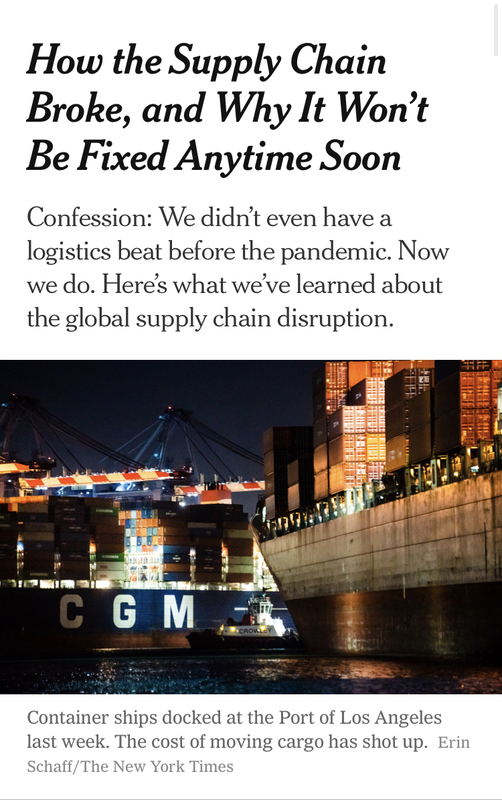 2021-10-22
2021-10-22How the Supply Chain Broke, and Why It Won’t Be Fixed Anytime Soon
This New York Times article from October 22nd, 2021 - updated October 31st - explains the current status of the global supply chain. Global Correspondent, Peter S. Goodman, writes that Covid exacerbated existing problems in the supply chain. This is relevant to the art industries in ways people often overlook. Coordinating shipments to meet deadlines in international art exhibitions, loaning works or consigning are all things that I used to struggle to plan for in light of covid when there would be unprecedented shipping delays and costs. Additionally, clients always want lower costs for shipping newly acquired works, however, it is now even more difficult to marry sales and client relations with the realities of shipping. -
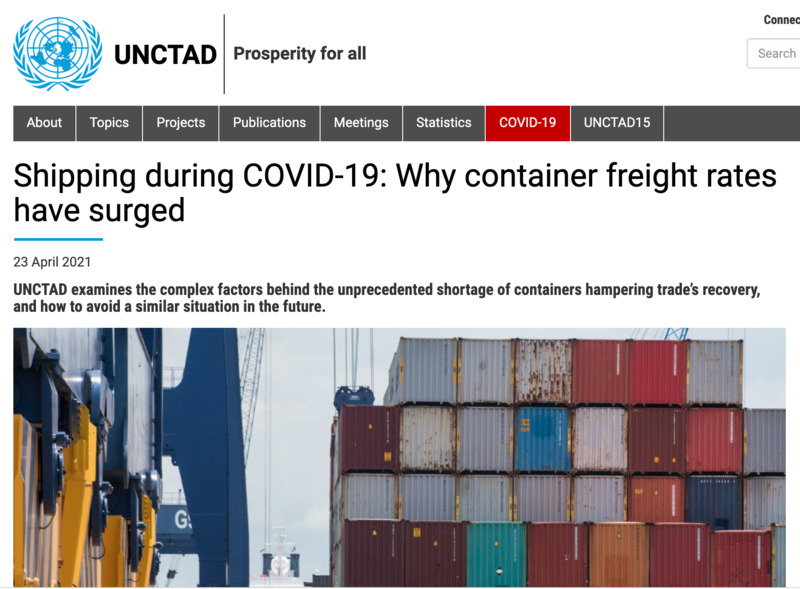 2021-04-23
2021-04-23Shipping during COVID-19: Why container freight rates have surged
UNCTAD (United Nations Conference on Trade and Development) included an article on their website which examines the shipping container shortage. More broadly, it comments on the staggering domino effect of the pandemic on industry and consumers and offers future solutions for avoiding current problems. The article concludes with a section that provides insight into how to avoid shipping container shortages in the future. -
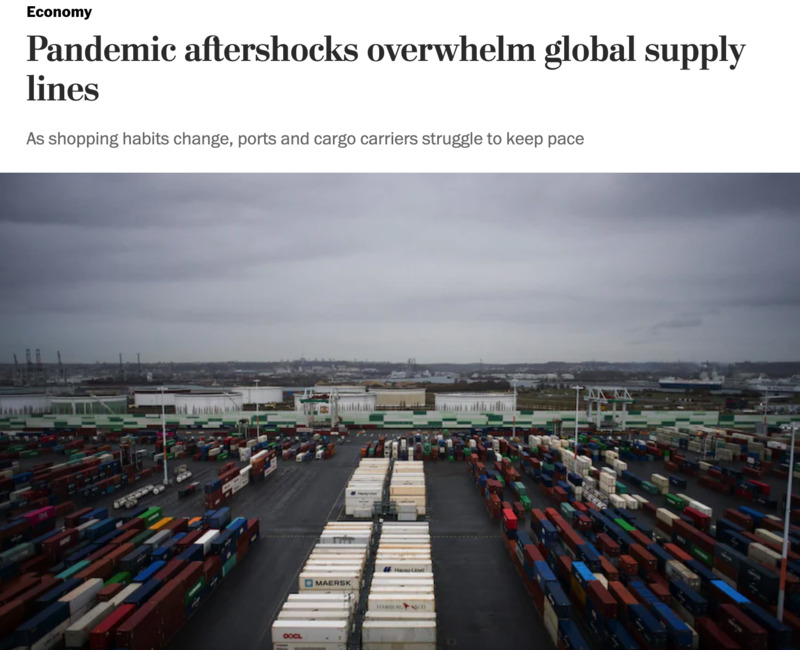 2021-01-24
2021-01-24Pandemic aftershocks overwhelm global supply lines
The Washington Post article discusses the disruptions in the supply chain and the repercussions such as inflated prices, failure to meet schedules, and effects on different industries. The domino effect was set off by the pandemic but we continue to see the fallout. Shipping artwork is a cost that galleries, advisories, collectors, and museums have to factor into their finances. Inflation in the cost of international shipping in particular and unpredictable delays negative effect openings and coordinating with clients and vendors. -
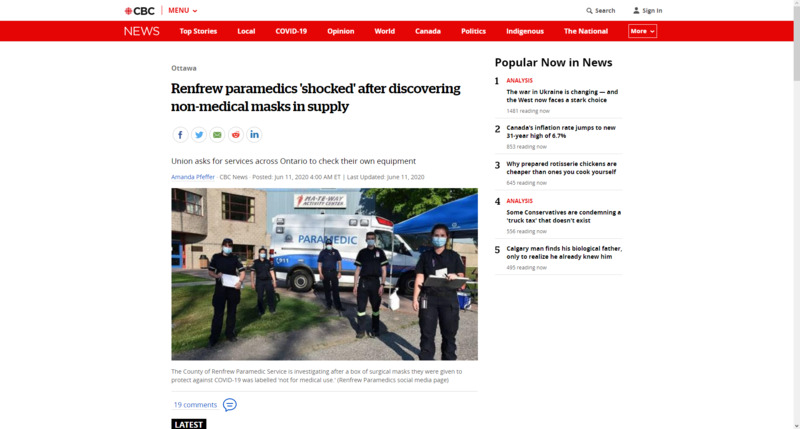 2020-06-11
2020-06-11Renfrew paramedics 'shocked' after discovering non-medical masks in supply
News story about non-medical masks discovered amongst the supply provided to Renfrew County paramedics and the resulting need for extensive Covid-19 testing of paramedics and those who had used the ambulance service during the period when the masks were in circulation. The incident serves as an example of the trust that equipment, even when it is available, will protect workers and the public being broken.
